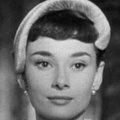Our question this week comes from China. Shaune wants to know about actress Audrey Hepburn.
Hepburn won an Academy Award as Best Actress for her first major American movie, "Roman Holiday," which was released in nineteen fifty-three. But she is remembered as much for her aid work as for her acting.
Audrey Hepburn was born in Belgium in nineteen twenty-nine. Her father was British and her mother was Dutch.
Audrey was sent to live at a British school for part of her childhood. During World War Two, she lived and studied in the Netherlands. Her mother thought it would be safe from German attacks.
Audrey studied dance as a teenager and during college when she returned to London after the war. But she realized she was not going to be a ballerina. So she began taking acting parts in stage shows. Later she began to get small parts in movies.
But it was Audrey Hepburn's move to America that brought her true fame. In nineteen fifty-one she played the character "Gigi" in the Broadway play of the same name to great critical praise. Two years later, "Roman Holiday" made her a star at the age of twenty-four. Audrey Hepburn made more than twenty-five movies. Among her most popular roles were Holly Golightly in "Breakfast at Tiffany's" in nineteen sixty-one. Three years later she played Eliza Doolittle in "My Fair Lady." She was married two times and had one son by each husband.
In nineteen eighty-nine, the United Nations Children's Fund named Audrey Hepburn a goodwill ambassador. She travelled all over the world in support of UNICEF projects.
The UN agency said she was a tireless worker. She often gave fifteen interviews a day to gain money and support for UNICEF projects. She also spoke before the United State Congress many times to appeal for aid for needy children.
Audrey Hepburn often said her loyalty to UNICEF was the result of her experiences as a child during World War Two. She said she knew what it was like to be starving and to be saved by international aid. She was a goodwill ambassador until her death in nineteen ninety-three from colon cancer. She was sixty-three.

